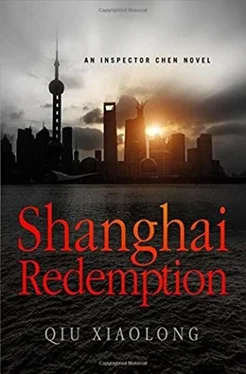
Qiu Xiaolong
Shanghai Redemption
The ninth book in the Inspector Chen series, 2015
Because I do not hope to turn again.
– GUIDO CAVALCANTI
APRIL IS A CRUEL month, if not the cruelest.
For Chinese, April 5 ushers in the Qingming Festival, a date in the lunar calendar considered appropriate for qingming -grave-visiting or -sweeping. During Qingming, people visit the graves of their family, present an offering, and express their feelings. It’s an important and time-honored tradition. In the seventh century, Tang dynasty poet Du Mu wrote a quatrain about the scene.
Around Qingming Occasion, it drizzles / on the heartbroken travelers treading the roads, / “Oh where can we find a tavern, please?” / A shepherd boy points to the Apricot Blossom Village .
Confucius said, “If you present an offering at the graves of the dead, the dead will appear in front of you, as if still living.”
In ancient times, Qingming wasn’t an easy obligation. For graves that were far away, people had to travel-boat-taking, donkey-riding-carrying offerings, and were often left worn-out and miserable on a rainy day.
In the twenty-first century, there were special Qingming buses. On one such, traveling to the Suzhou cemeteries, Chen Cao, ex-chief inspector and ex-Deputy Party Secretary of the Shanghai Police Bureau, was sitting stiff-backed among a group of grave-visitors as the bus crawled along the congested highway. He thought about Du Mu’s lines as he looked out the window, then at his own reflection in the grimy glass. A flurry of raindrops fell from the roadside willows, glistening as if in grateful tears.
More and more, Qingming was becoming a national holiday, and that fact was giving rise to new problems, particularly for the people of Shanghai. With the price of land in Shanghai soaring, people seeking a place to bury loved ones had to look to cemeteries outside the expensive metropolis. The feng shui and the manageable distance had made nearby cities like Suzhou popular alternatives. During Qingming, train tickets sold out days in advance, and the highways and roads were all crammed with vehicles. It could take four or five hours, instead of the usual two, to travel from Shanghai to Suzhou.
Chen decided to make the trip several days after the official Qingming Festival. Still, he balked at the idea of standing in the long lines circling the Shanghai railway station. And those lines, were he to travel by train would be only the beginning. At the Suzhou station, he’d have to stand in another long line, either for a local bus or for a taxi to the cemetery itself.
So for this Qingming trip, he had decided to travel by bus instead. There was a seasonally dispatched one between the two cities that departed from the People’s Square in the morning, went directly to the cemeteries in Suzhou, and then headed back to Shanghai in the early afternoon. Convenient and inexpensive, it was sometimes derisively called the “cemetery bus.” In this new materialistic century, traveling by bus was too shabby for the status of the “already rich.” Instead, they went grave-sweeping in their own luxury cars, sometimes driven by chauffeurs. The passengers on the bus, however, unable to afford their own cars or the expensive high-speed train tickets, were clearly not so well-to-do.
It was not much of a bus. Old, worn-out, and dust-covered, there was nothing fancy or even comfortable about it. From where he perched himself, the plastic seat was hard, the floor dirty, the windows cracked. At his feet, a couple of late-arriving passengers were sitting on the floor.
Chen hadn’t done any grave-sweeping for several years. He had been too busy working one case after another with the Shanghai Police Bureau’s Special Case Squad. But a change in his position had handed him an unexpected break, and he decided to seize the opportunity. He took out a pack of rumpled cigarettes, then stuffed it back into his pants pocket. The air in the bus was horrible enough, his eyes squinting against a gray shroud of smoke. Waving his hand in front of his eyes, he recalled a similar bus trip several years ago. At the time, it hadn’t struck him as all that uncomfortable. But since then, he’d been spoiled by all the privileges of his position as a Party cadre.
Another drawback to taking the cemetery bus: there was no immediate return. On a day trip to Suzhou, most people liked to do more than simply grave-sweeping. After kowtowing at the cemetery in the morning, they might go to the Xuanmiao Temple Market for tea and snacks, walking around shopping and garden-visiting before returning on the afternoon bus, or perhaps enjoying a Suzhou-flavor dinner before finally taking the evening train back to Shanghai.
Chen was in no mood for tourist activities.
There was no deceiving himself-he was in trouble.
It had been announced the day before, without any warning, that Chen was being removed from his deputy Party secretary and chief inspector positions in the Shanghai Police Bureau and would now serve as the director of the Shanghai Legal Reform Committee.
The decision was presented as a simple exchange of positions. To the outside observer, it might even look like something of a promotion. As a type of cold comfort, the new position even had the same Party cadre rank-and didn’t even have a “deputy” before the title.
But this was a familiar trick in China’s politics, a demotion in the guise of promotion. The committee position was one without real power. The committee was decorative at best, mainly responsible for making reports or suggestions to higher authorities. Because the interests of the Party outweighed those of the legal system, the legal system was anything but independent, and thus a position on a committee focused on “legal reform” didn’t compare to one in the police bureau.
The new appointment was merely a reassuring gesture to Chen and to the public, at a time when “stability maintenance” was a top political priority. Chen was known as a capable and honest police officer, and his sudden removal could have led to unwanted speculation.
But why? It gave him a headache to even think about it.
At the police bureau meeting where the change was announced, Party Secretary Li had said with a catch in his voice, “The higher authorities have decided that Comrade Chen Cao is to shoulder heavier responsibilities for the Party. His extraordinary work all these years is greatly appreciated. A legendary police officer, Chief Inspector Chen has always been our pride. So I’d like to suggest that the chief inspector maintain his office here. There is no rush for him to clear out and move his things. This is his old home, and we hope he comes back to visit us often.”
Teng Shenguo, the chief of staff for Shanghai Party Secretary Lai Xi, also called Chen personally, emphasizing the significance of Chen’s new job. “Congratulations! It’s an arduous yet important task to build a legal society in China. The position requires a lot of research and experience. Comrade Lai agrees that you alone are qualified to take on this responsibility, Director Chen.”
Given the possible candidates in the Shanghai Police Department, that statement was probably true. But it sounded like an echo from the People’s Daily : hollow words, totally unconvincing. Whatever else it was, the new position was not something that called for congratulations.
So Chen found himself on the shabby, packed bus to Suzhou, deprived of the “chief inspector” before his name, a title which, to him, was almost like a shell to a snail.
Читать дальше













